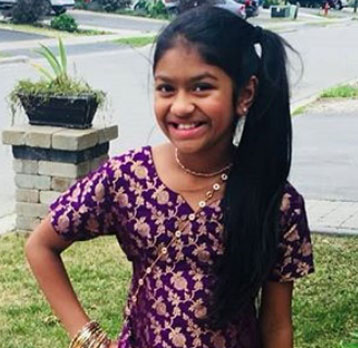Founded by Preity Kumar, Suzanne Narain, and Talisha Ramsaroop, Lotus is a grassroots organization in Toronto, Canada which focuses on building social connections, educational initiatives, and empowering the lives of Indo-Caribbean women. Lotus works to create a sustainable space for sharing our stories, and to document our histories as an Indo-Caribbean diasporic community. The group can be found on Facebook at Lotus Toronto and emailed at lotusinthe6@gmail.com
On February 14th, 2019, Riya Rajkumar, 11, was murdered by her father Roopesh Rajkumar in Brampton, Ontario, Canada. Earlier that evening on Feb 14th, an amber alert (a broadcast message seeking public assistance in finding abducted children) was released, searching for Riya. A second message followed that she had been found, but it was not until the next morning that we all woke to the devastating and heartbreaking news that Riya Rajkumar was killed, on her birthday – a birthday that she shared with her mother. The family, who live in Brampton, are of Indo-Guyanese descent.
Riya’s mother, Priya Ramdin, went to the police after receiving disturbing messages from Roopesh Rajkumar indicating that he planned to harm himself and his daughter. In the diaspora, however, black and brown bodies are not as protected in the same ways that white bodies are. There are so many unanswered questions, the first being why it took so long for an amber alert to be released to aid in the search for Riya. A question that will remain with us forever, if the amber alert went out sooner, could Riya have been saved?
There are three lives that will never be the same from this tragedy, Riya’s mother, father, and of course, Riya, whose short life has impacted so many people. In one news report, her mom described Riya as a “happy and positive child. She loved life and was always excited about everything life had to offer”. Riya wanted to be a doctor. She was known as being a leader, vibrant and full of life. Her teachers described her as “always smiling” and “a sparkle in the building”. Hundreds of people gathered to honour her life last week. Happy birthday balloons were placed next to her white coffin, adorned with flowers. Riya’s death has made us, once again, reflect on the prevalence and long, traumatic history of violence against women and children, especially in the Indo-Caribbean community.
Writer Gaiutra Bahadur asks, “how could [we] write about women whose existence is barely acknowledged?” When we think of Riya, Bahadur’s question strikes a chord —
how can we write about her within layers of history and patriarchal structures? Bahadur asks us to consider our “inheritance of harm” as part of the residual effect of colonialism in the Indo-Caribbean community. What are our legacies? What discourses of harm have been given to us, shrouded as gifts? How can we speak of Riya and place her in this history? How do we write her into existence and history, when her own history has been a key factor in her murder? How do we as a community grieve and talk about this loss? Sadly, our community is not really open to having conversations about the violence and subsequent deaths that occur as a result of such violence. Such violence is too often interpreted as a normal feature of love, especially in a heterosexual romantic intimate partner relationship. And the violence between parent and child is also seen as part of how one parents, not as a sign of abuse.
The legacy of intimate partner violence and trauma is not new in the Indo-Caribbean community, and continues to be manifested in the diaspora. Riya’s death is but one tragic example. In November 2018, Jessica Motilall and her mother were violently assaulted in Toronto by her step father. Jessica and her mother suffered years of abuse and the last attack was life threatening. In January 2018, Stacy Singh, 26, was murdered by her husband in New York. Vanessa Zaman, 18, and her cousin, Leona Samlall, were killed by Vanessa’s father in Florida in December 2018. A friend of the Lotus family, Christina Sukhdeo, 19, was kidnapped and murdered by her ex-boyfriend in 2003 in Toronto. All of the women and their attackers are Indo-Guyanese. We write their names to remember their lives, and to highlight that Indo-Guyanese women in the diaspora continue to be victims of domestic and intimate partner violence. All of these women’s lives were cut short by the hands of men in their life. We all have a cousin, an aunt, a sister, or neighbour who has been a victim of gender-based violence. We hear the stories, feel a touch of sadness and move on thinking it was that one father, brother, husband etc. Perhaps violence is a legacy that continues to haunt the Indo-Guyanese community, whether in Guyana or the diaspora. This legacy of violence and intergenerational trauma needs to be addressed, to help us heal and find alternative ways to deal with hard emotions other than through violence. In addition to being victims of violence, too often the women are blamed for the abuse from their male partners in the Indo-Guyanese community, instead of the men being held accountable for their anger, jealousy or possessiveness which are key factors in many of these deaths. No woman deserves to be abused, and blaming women for the violence inflicted on them does not solve the problem of domestic abuse, it only enables it. We need to do better, and be more critical in our conversations about relationships and violence. Every other day, a woman or child is killed by domestic violence in Canada. In 2017, in Guyana, there were 457 reports of domestic violence. Berbice, a region with a significant Indo-Guyanese population, has the highest reports of domestic violence in Guyana, with over 10 women killed there in 2017. Whether in Guyana or the diaspora, we cannot ignore the fact that domestic violence is a serious problem in the Indo-Caribbean community and many other communities as well. Riya’s death is a manifestation of this problem as she became the victim of her father’s anger, rage and violence.
Along with domestic violence, mental health intersects Riya’s story and this tragedy. It is unfathomable that anyone can kill a child, much less their own child. There are suggestions that Roopesh Rajkumar was dealing with mental health issues. There is no justifying the heinous crime that Rajkumar committed in taking the life of his daughter. This tragedy is, however, a wake-up call for our community that mental health is affecting us and we need to start talking about it in real ways, in particular with men. As Riya’s final rites were performed on February 20th, Roopesh Rajkumar died in the hospital of self-inflicted gunshot wounds. We must not position mental health as an excuse for violence or bad behaviour, but we must take seriously the fact that men are living with mental health issues in our community. There are also significant barriers for racialized men in accessing mental health services in Toronto. In what ways are men expressing and dealing with their emotions and anger outside of sports, drinking and the exercise of violent behaviour? Do we live in a society that makes it permissible for men to easily express sadness, hurt, and loss? The intersections of mental health for racialized men in Canada need further addressing and work. We can also point to all the intersecting structural problems of toxic masculinity, patriarchal systems, gender ideologies, and lack of mental health support that got played out in this case — sites where we can direct our anger and frustration. It is easy to point to these sources to direct our anger and rage. If we want to do the work of healing, we also need to locate these men within our histories. Otherwise, we will have a fragmented community, with partial healing, and most importantly, boys and men will be missing from our crucial dialogues. It is necessary as a community, to think about how we can collectively mourn and come together now.
While there are many intersecting structural factors that we can identify that caused Riya’s death, for now, we as a community remain in horror, disbelief, grief, and sadness. The community in Toronto, especially the Indo-Caribbean community, hopes and prays that we never experience such a tragedy again. And while there is lots of work to be done, Lotus and the extended community will continue to remember and honour Riya, as well as have conversations in our community that address domestic violence, mental health and healthy relationships. Riya, your name and life will remain with us always. A sparkling star who had so much to offer the world and was taken far too soon. If there was ever a time for the Indo-Caribbean diaspora in Toronto to come together, it is now, at a time when our community is in pieces, our hearts broken. In the darkness of her loss there has been some light as we gathered to collectively mourn her. Riya’s name is a reminder of the importance of having conversations about violence, breaking the silence about something that is normalized and swept under the rug. We encourage our communit(ies) to spend some time reflecting on how violence has affected you. Talk to your children, family and friends, and let us try to prevent such a tragedy from ever happening again.







